 LTPAQ-D & Protocol
LTPAQ-D & Protocol
The Leisure Time Physical Activity Questionnaire for People with Disabilities (LTPAQ-D) is valid and reliable self-report measure of leisure time physical activity participation for use among people with physical and/or sensory disabilities. The LTPAQ-D takes less than 5 minutes to complete and assesses the frequency, duration, intensity and type (aerobic and strength-training) of leisure time physical activity performed over the past 7 days. The LTPAQ-D, adapted from the LTPAQ for people with spinal cord injury (SCI), has also demonstrated evidence of validity and reliability for people with SCI.
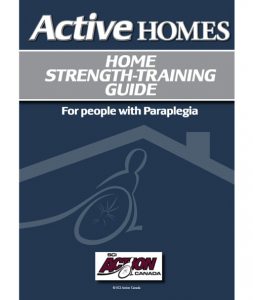 Active Homes
Active Homes
Active Homes is an SCI Action Canada initiative that began as a research study. The purpose of the study was to determine the success of a home‐based introductory strength‐training visit aimed to increase thoughts and feelings about strength‐training activity, and strength‐training behaviour itself, among people with SCI (Latimer, A.E., et al, 2010)
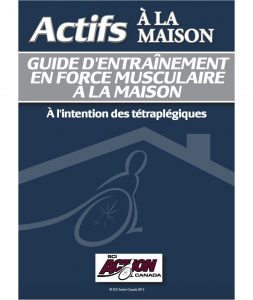 Actifs à la maison
Actifs à la maison
Actifs à la maison est une initiative de SCI Action Canada qui a commencé sous la forme d’une étude de recherche. L’objectif de l’étude était de déterminer le niveau de succès d’une visite à domicile présentant l’entraînement en force musculaire et visant à aider les personnes vivant avec une lésion médullaire à nourrir des pensées positives au sujet des activités d’entraînement en force musculaire et à renforcer les comportements relatifs à la pratique de ces activités (Latimer AE et al., 2010).
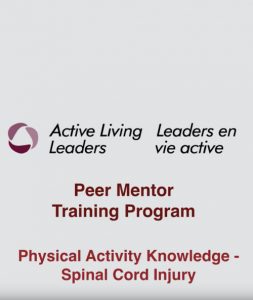 Active Living Leaders
Active Living Leaders
Active Living Leaders is comprised of a series of peer-mentor training videos with a goal of helping people who would like to use the latest physical activity knowledge, sport resources, and transformational leadership principles to inform and motivate adults living with spinal cord injury to lead more active lives.
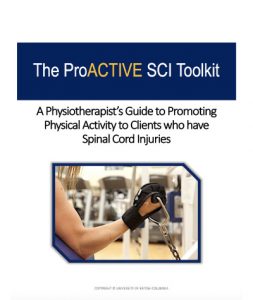 ProACTIVE SCI Toolkit
ProACTIVE SCI Toolkit
The ProACTIVE SCI Toolkit is designed to help physiotherapists work with their clients with SCI to be physically active outside of the clinic. It’s a step-by-step resource that uses three overarching strategies including education, referral, and prescription to develop tailored strategies that work for both the physiotherapist and their client with SCI.
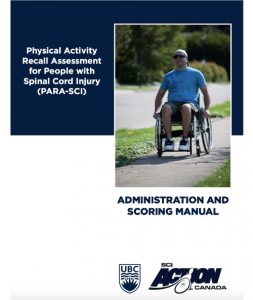 PARA-SCI Manual (2024 – 3rd edition)
PARA-SCI Manual (2024 – 3rd edition)
The Physical Activity Recall Assessment for People with Spinal Cord Injury (PARA-SCI) is a self-report physical activity measure for people with spinal cord injury (SCI). The assessment is completed using a semi-structured interview protocol. It aims to measure the type, frequency, duration, and intensity of physical activity performed by persons with SCI who use a wheelchair as their primary mode of mobility. The PARA-SCI utilizes a 3-day recall format that is loosely based on the Seven-day Physical Activity Recall (PAR-7 (1)). The PARA-SCI measures activity actually performed over a three-day time period (rather than activity that is usually performed).
Physical Activity, Active Living, and Sport Resource Catalogue: Online resources for Canadians living with disabilities
Coming soon
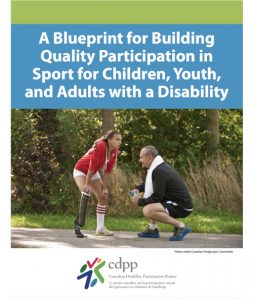 The Blueprint for Building Quality Participation in Sport for Children, Youth, and Adults with Disability
The Blueprint for Building Quality Participation in Sport for Children, Youth, and Adults with Disability
- The Blueprint for Building Quality Participation in Sport for Children, Youth, and Adults with a Disability introduces key concepts that underpin quality participation, and provides tools for building quality participation in sport programs.
- The research evidence supporting the Blueprint is summarized in a supplemental report: Evidence-Based Strategies for Building Quality Participation in Sport for Children, Youth, and Adults with a Disability.
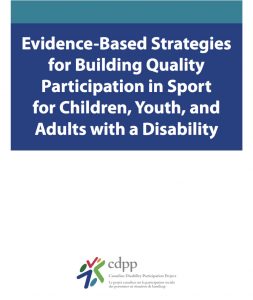 Evidence-Based Strategies for Building Quality Participation in Sports for Children, Youth, and Adults with Disability
Evidence-Based Strategies for Building Quality Participation in Sports for Children, Youth, and Adults with Disability
- This report was developed as a supplement to The Blueprint for Building Quality Participation in Sport for Children, Youth and Adults with a Disability and summaries the evidence supporting the 25 strategies for building quality participation outlined in the Blueprint.
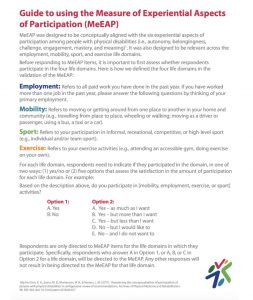 Measure of Experiential Aspects of Participation (MeAP)
Measure of Experiential Aspects of Participation (MeAP)
- In collaboration with Canadian Disability Participation Project researchers (cdpp.ca), we have developed a measure to evaluate the quality of participation for people with disabilities across employment, mobility, and sport and exercise life domains.
- The Measure of Experiential Aspects of Participation (MeEAP) was designed to be conceptually aligned with the six experiential aspects of participation among people with physical disabilities (i.e., autonomy, belongingness, challenge, engagement, mastery, and meaning).
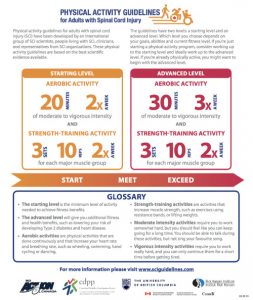 Canadian Physical Activity Guidelines for Adults with Spinal Cord Injury
Canadian Physical Activity Guidelines for Adults with Spinal Cord Injury
- The Canadian Physical Activity Guidelines for Adults with Spinal Cord Injuries (SCI) are based on scientific exercise guidelines rigorously developed by an international group composed of SCI scientists, people living with SCI, clinicians, and representatives from SCI organizations.
- The guidelines have two levels: a starting level and an advanced level. Which level you choose depends on your goals, abilities and current fitness level.
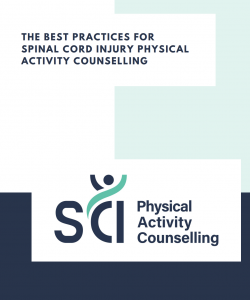 SCI Physical Activity Counselling Training
SCI Physical Activity Counselling Training
- This project was conducted by an international expert panel, including SCI researchers, counsellors, physiotherapists, occupational therapists, recreation therapist, personal trainers, inclusive educational expert, and people with SCI.
- The best practices for SCI physical activity counselling are available in English, Dutch, and French (refer to the Downloadable Resources). The training modules on SCI physical activity counselling will be freely available. Information on the registration will follow soon.
Recommendations ISCoS PA SIG
